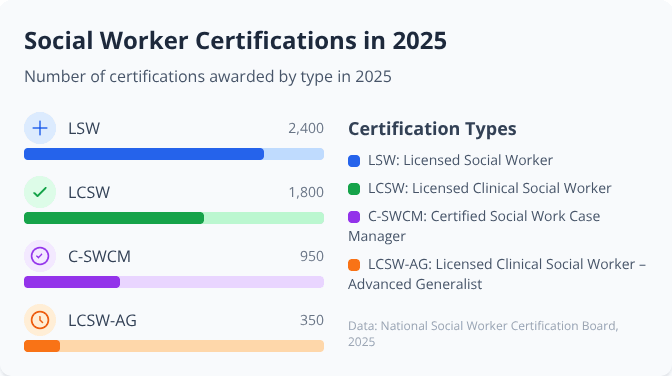Social Worker Resume Certifications

Imagine your resume as a vending machine—certifications are those shiny snacks everyone actually wants. Listing them shows you’re more than just talk; you’ve got the skills and proof to back it up. In this article, you’ll learn which credentials make employers do a double-take and how to showcase them without looking like you tried too hard.
Why Certifications Matter for Social Worker Careers
A certification isn't just a piece of paper; it signals that a social worker has gone above the basics, sweating through rigorous standards and specialized study. Employers notice, instantly seeing proof of real expertise and updated knowledge in the ever-shifting world of social work. Clients, too, feel reassured by those post-nominal letters—a subtle promise of commitment and competency. In a sea of applicants, certification’s a bright flag waving: “I’m serious about making a difference.”

Adding a certifications section to your resume can really boost your chances, especially for social work jobs that look for specific training or credentials.
Must-Have Certifications for Social Worker
Licensed Clinical Social Worker (LCSW): This credential signals advanced clinical skills and is often required for independent behavioral health practice and supervision roles.
Certified Social Work Case Manager (C-SWCM): Recognized for demonstrating expertise in managing complex client cases, ensuring holistic support and coordination of community resources.
Academy of Certified Social Workers (ACSW): Highlights a commitment to professional development and high ethical standards, enhancing credibility across the social work spectrum.
Certified School Social Work Specialist (C-SSWS): Affirms specialized skills in addressing student educational, social, and emotional challenges within school systems.
Certified Advanced Children, Youth, and Family Social Worker (C-ACYFSW): Distinguishes those with advanced capabilities in working with vulnerable children and families in diverse settings.
Certified Hospice and Palliative Social Worker (CHP-SW): Validates expertise in palliative and end-of-life care, supporting patients and families during critical transitions.
Clinical Alcohol, Tobacco, and Other Drugs Social Worker (C-ATODSW): Specializes in substance use intervention and recovery strategies, identifying professionals equipped for addiction-focused environments.
DO'S
- Highlight only relevant certifications closely tied to social work.
- Place certifications in a dedicated section near the top or after your education.
- Include the full name of each certification along with the issuing organization and date earned.
DON'TS
- Don't list expired or irrelevant certifications.
- Don't clutter your resume with acronyms nobody recognizes.
- Don't exaggerate the scope or level of your credentials.
Pro Tip: Spotlighting the certifications that really matter signals instantly to employers that you’re equipped to tackle their unique challenges, saving them from squinting through a jungle of less relevant details and showing them you mean business right from the start.



